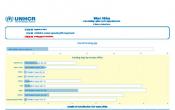Liberia
Operation: Liberia
Location
{"longitude":-10,"latitude":7,"zoom_level":7}
Latest update of camps and office locations 13 Jan 2016. By clicking on the icons on the map, additional information is displayed.
Key Figures
| 2015 end-year results | |
| 1,114 | Ivoirian refugees returned to their country of origin after the voluntary repatriation operation resumed in December 2015 |
| 100% | refugees in the camps and in the communities remained Ebola free because strong preventative measures were introduced |
| 100% | of camp-based people of concern had access to health care and portable water, which was well within acceptable standards |
| 2016 planning figures | |
| 28,201 | refugees who have adequate shelter |
| 12,126 | Ivorian refugee primary school-aged children enrolled in primary education |
| 11,534 | Ivorian refugees of the age 18-59 years owning their own businesses or being self-employed |
People of Concern
5%
Decrease in
2015
2015
| 2015 | 38,058 |
| 2014 | 40,121 |
| 2013 | 54,932 |

[["Refugees",36505],["Asylum-seekers",15],["Returned refugees",58],["Stateless",1],["Others of concern",1479]]
Loading ...
Budgets and Expenditure for Liberia
< Back
2015
{"categories":[2012,2013,2014,2015,2016],"budget":[64.81663059,42.55998615,35.95709935,34.164707281,23.86090725],"expenditure":[41.54598651,22.36514474,18.86138998,15.36285384,null]}
{"categories":[2012,2013,2014,2015,2016],"p1":[50.69877827,42.55998615,35.95709935,34.164707281,23.86090725],"p2":[null,null,null,null,null],"p3":[14.11785232,null,null,null,null],"p4":[null,null,null,null,null]}
{"categories":[2012,2013,2014,2015,2016],"p1":[29.50311234,22.36514474,18.86138998,15.36285384,null],"p2":[null,null,null,null,null],"p3":[12.04287417,null,null,null,null],"p4":[null,null,null,null,null]}
Loading ...
CHOOSE A YEAR
- 2014
- 2015
- 2016
Working environment
- The World Health Organization declared that the outbreak of the Ebola virus was an international public health emergency in August 2014. The national health system in Liberia did not have the capacity to monitor the situation and develop an integrated response, resulting in high rates of transmission. The virus continued to spread in 2015, but containment measures brought under control two outbreaks after Liberia was first declared Ebola free in May 2015. The border with Côte d’Ivoire remained closed throughout 2015.
- The situational assessment reports of the United Nations Mission in Liberia indicated that the overall security situation in the country remained generally stable, though fragile.
Population trends
- In Liberia, the number of persons of concern to UNHCR, mainly Ivorian refugees, declined from 40,000 to 38,000 in the course of 2015.
- Some 1,000 births were registered during ongoing registration activities in 2015. The files of over 400 individuals were reactivated in Liberia’s refugee database, while the files of 2,100 others, deemed no longer present in the country, were deactivated at the end of the year.
Achievements and impact
- Revised Refugee Act was tabled in Parliament. As amended, the Act, also included provisions to prevent and reduce statelessness, as per the Abidjan Declaration on the eradication of statelessness, which was adopted by Member States of the Economic Community of West African States (ECOWAS) in February 2015.
Unmet need
The following unmet needs were experienced as a direct consequence of lack of funding:- Lack of access to secondary education exposed refugee youth to protection risks, including violence, exploitation and abuse.
- Limited livelihoods support resulted into more reliance on assistance.
- Rate of malnutrition among children under the age of 5 was reportedly higher as compared with last year.
Working environment
Liberia is a signatory to the 1951 Refugee Convention, its 1967 Protocol, and the 1969 OAU Convention. Liberia is also signatory to the 1954 Convention relating to the Status of Stateless Persons and the 1961 Convention on the Reduction of Statelessness.UNHCR’s operation in Liberia revolves around two main strategies: continued provision of protection and assistance to refugees and the pursuit of, and support for, voluntary repatriation of Ivorian refugees. With more and more Ivorian refugees willing to return, voluntary repatriation will remain a UNHCR priority in Liberia.
Should the Ebola virus outbreak continue, UNHCR will continue to collaborate with the Ministry of Health and Social Welfare on the integration of refugees into the national Ebola virus disease response plan and increased access to the Ministry’s services.
UNHCR foresees two particular challenges in 2015: the spread of the Ebola virus and the organization of elections in Côte d’Ivoire, which could result in insecurity in border areas and the potential arrival of refugees in Liberia.
Needs and strategies
The Ebola outbreak in 2014 led the Government of Liberia to declare a state of emergency, including the closure of borders with Côte d’Ivoire. UNHCR has therefore been reviewing its strategy in Liberia, particularly with regard to voluntary repatriation. In the latter part of 2015, UNHCR will redirect its strategic focus to pursuing durable solutions, in particular voluntary repatriation alongside resettlement as a strategic protection tool.UNHCR and its partners will continue to provide access to self-reliance and skills-training opportunities for refugees, in order to mitigate the emerging trends of survival-sex work, gender-based violence, and teenage pregnancies, as well as criminal activities, among the adolescent population.
In the first six months of 2014, UNHCR facilitated the repatriation of 12,000 refugees, mainly from Côte d’Ivoire, despite the closure of the borders. With Ivorian refugees increasingly willing to return, and once voluntary repatriation resumes, UNHCR is anticipating that the camp population will decrease in 2015. It envisages the consolidation of camps, with the closure of the Little Wlebo camp in Maryland County and the transformation of Bahn Camp in Nimba County into a local settlement site, under the authorities’ supervision.

